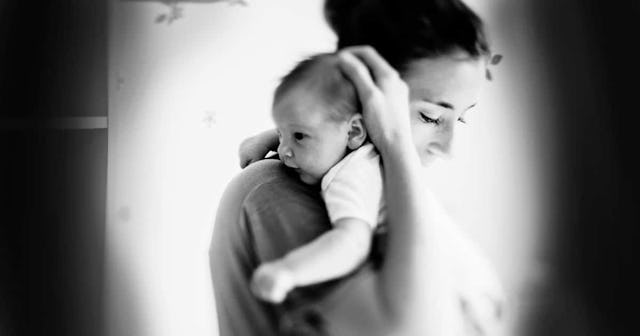'By The Way, You Might Have Postpartum Depression'

“Oh, by the way, you might have postpartum depression,” the pediatrician casually announced from the doorway of the examining room. He had just finished the two-month well baby checkup for my healthy, wobbly newborn daughter and had said our appointment was through, so I was getting ready to leave.
“It’s from that form you filled out. Yeah, you might want to see someone about that,” he said, somehow farther away, less in the door frame and more in the hallway of the office.
“Okay then, good luck!” he said, now in mid stroll, already down past the next room and onto the next tiny, gaseous patient.
I stood in amazement and awe of the ignorance of this man. First of all, he was absolutely right: I did have postpartum depression. The last few weeks had been a total living hell for me. I would cry myself to sleep so often that my eye mask was growing mold. I wanted each day to be over as soon as I woke up, but wasn’t sure how I could even make it through the day. I kept telling my husband, “I just can’t do this anymore” when I really wanted to tell him “I think I want to die; not to kill myself, but I just don’t want to live this life anymore.”
Thankfully, along with postpartum depression, I also had an amazing therapist. A therapist that I had been seeing before, during, and after my pregnancy. One that knew I was at a higher risk for postpartum mood disorders, and who had been ready with an action plan when the feelings arose.
Thomas Barwick/Getty
But this doctor bobbling down the hallway didn’t know any of that. For all he knew, this “form” was my call for help. For all he knew, this was the first time I had seen daylight in weeks. For all he knew, which was not much on the front of maternal health and wellness, I was contemplating something serious to harm myself.
So his decision to casually tell me I might have postpartum depression from the door frame of his exam room felt familiarly cold and callous. It was, yet again, an affirmation that I was a complete and total afterthought in a world that revolves around this loud and gassy baby. I was merely the sideshow in my tiny wiggly human’s life. I felt smaller than my baby’s microscopic fingernails. (And seriously, they’re so goddamn small.)
How the hell did he let me hobble out of the office with no help with the door, no human contact, and no resources? When will we, the mothers of these blobs of rolls, ever become important to these physicians? When will the doctors look past the baby and see the person standing behind it? When will that person become important enough to care about? When will they realize that a mother’s mental health is directly proportional to the physical health and survival of her baby? How many chances had he missed to help someone who was suffering?
I am not sure if I have any of the answers to these questions, but I am sure of one thing: We need to fight for better postpartum mental health care for mothers. We have to make our voices loud and clear and let them know that we are so much more important, deserving of something far better than the sub-par mental health care we are receiving. We have to speak up for all the mothers who suffer, for all the mothers who are mistreated or misdiagnosed, and for all the mothers, like me, who were just flat out ignored.
Because you can’t properly treat a baby without treating its mother. And you cannot treat the mother if you just see her as an afterthought.
This article was originally published on